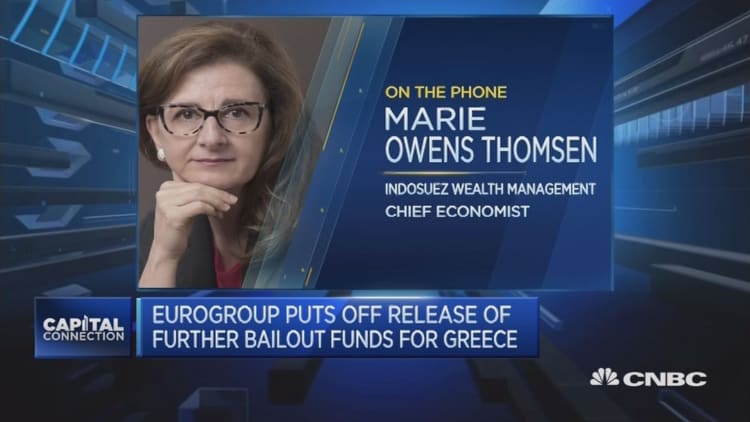ATHENS–Greece may have been labeled the basket case of Europe, but for some contrarian investors, it has offered heady returns in stocks and bonds this year.
The investor march into Greek markets is in anticipation that the country will secure additional debt relief from the euro-area countries — which holds 80 percent of the country's 326.5 billion euros ($365.7 billion) debt — after years of stringent austerity measures.
On Thursday it's hoped a deal will be struck at the Eurogroup meeting in Luxembourg to secure new loans to pay off Greece's debts that are set to come due for repayment in July.
After seven years of tax and social reform that has slashed pensions, wages and social benefits, Greece has one of the best-run public finance performances in the euro zone. Last year the country had a budget surplus of 0.7 percent of GDP, almost as much as Germany. In 2009 the deficit was 15.6 percent of GDP.
More from Global Investing Hot Spots:
Here's why the gusher of billions into European stocks should continue
Forget buying real estate in the US
An anti-Buffett investing bet that's suddenly busting out
Recognizing this trend, investors have poured money into the American-listed Global X MSCI Greece exchange-traded fund (GREK), an ETF that rises and falls with the overall economy of Greece. It is up more than 25.1 percent on a year-to-date basis, while total returns for a year period is up by about 31.8 percent.
"Many of the stocks inside GREK are undervalued, including Hellenic Telecomunications, the Greek Organisation of Football Prognostics, and Jumbo, a retail chain," says Todd Rosenbluth, director of ETF and mutual fund research at CFRA.
Now investors are eyeing Greece's bond market. It has been reported that Greece will roll out its first sovereign-debt issue in three years in July if its international lenders specify longer-term debt relief for the country, and the European Central Bank includes it in its bond-buying program.
Sources in Athens say they want to test the market appetite for Greek debt before a current bailout program worth up to 86 billion euros ($96.3 billion) expires in mid-2018. They are considering swapping a five-year bond which was issued in 2014, with a new five-year bond and raising an amount over the same issue. The 2014 five-year bond raised 3 billion euros. The yield on Greece's five-year bond, maturing in 2019 was 5.03 percent on Wednesday.
Hanging in the balance
Whether or not a debt issue is raised depends on how the country is able to restructure existing debt, which now accounts for 179 percent of GDP, the highest in the euro zone. Talks over Greece's mountain of debt have stalled over disagreements between the IMF and European creditors led by Germany.
The IMF believes further debt relief is needed, but the EU is reluctant to offer any debt reduction before the end of the program in 2018. But pressure is on to reach a deal so Greece can make a payment of around 7.5 billion euros ($8.4 billion) due in July. In a cabinet meeting on Tuesday, Greek Prime Minister Alexis Tsipras said that "Europe must show that it is capable of overcoming intransigence."

"We expect a statement that will clear the way for the release of the next disbursement before Greek repayments become due in mid-July. We do not expect a major announcement on debt relief for Greece before the German elections in the fall," says Nikos Chryssochoidis, an Athens-based stockbroker.
The left ruling party of Syriza has been widely criticized for its inconsistency in words and deeds. Four in 10 Greeks believe that Tsipras' government has brought on the worst austerity measures, according to a recent poll by the University of Macedonia.
According to the same poll, New Democracy, the main opposition party, accounted for 32.5 percent of respondents' preference against 16.5 percent of Syriza. Also, 69 percent believe New Democracy will win the next elections, while only 12.5 percent said that about Syriza.
Shifting political tide
Popularity for the ruling party is waning as budget cuts continue to drive a large percentage of the population into poverty. According to Hellenic Statistical Authority, about 40 percent of the Greek population is in poverty. More than 430,000 people ages 15 to 64 have left the country to seek work abroad since 2010, according to Bank of Greece figures. The massive brain drain reflects the country's unemployment rate of 22 percent, the highest in the European Union.
Despite soaring unemployment, successive governments have increased taxes and cut pensions over the last seven years to qualify for bailouts from the EU and IMF. In May, under pressure from its creditors, the government slashed pensions again and cut tax breaks for 2019 and 2020, even for income just above the poverty level.
For this reason the leftist government will suffer great political damage if debt-relief measures fail, says Dr. Thanos Catsambas, a former alternate executive director of the IMF board of directors.
Despite economic uncertainty, many investors believe the timing is good for investing in Greece. "This is the right time to invest," says John Koudounis, CEO of Calamos Investments, an asset-management holding company with $20.1 billion assets under management. "There are good opportunities to make profits."
That is why Calamos, in cooperation with the Dutch company EXIN Partners, has placed a bid to buy National Insurance, the insurance arm of National Bank of Greece S.A. They reportedly submitted a bid valuing the company at 1 billion euros (US$1.12 billion).
According to the sources close to the transaction, "This is the highest offer among the potential investors."
By Nasos Koukakis, special to CNBC.com




